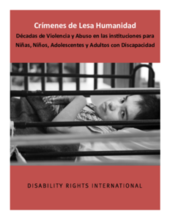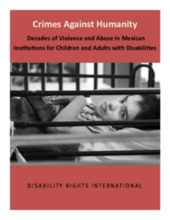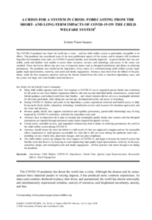This page contains documents and other resources related to children's care in the Americas. Browse resources by region, country, or category.
Displaying 261 - 270 of 1438
This study aims to examine the prevalence of overdose and the association with child removal in a cohort of marginalised women.
This systematic review synthesizes information about the relationships aging out foster youth have with their birth or stepparents after legally mandated separations in foster care.
This systematic review synthesizes information about the relationships aging out foster youth have with their birth or stepparents after legally mandated separations in foster care.
Este informe documenta violaciones graves y generalizadas a los derechos humanos de niñas, niños adolescentes y adultos con discapacidad en centros residenciales en México.
This report documents severe and pervasive human rights violations against children and adults with disabilities in residential facilities in Mexico.
The purpose of this study is to examine parents’ reports on the response their children received to their needs during the COVID-19 crisis.
The purpose of this study is to examine parents’ reports on the response their children received to their needs during the COVID-19 crisis.
This study evaluates the association between children placed in out-of-home care and neighborhood-level factors using eight years of administrative data.
This article calls on attorneys in the U.S. to learn from the fallout of the pandemic, retain the best responsive practices, and use the lessons learned from this crisis to transform dependency cases, and the child welfare system writ large, into what families need and deserve.
This report examines the two-sided dilemma for Venezuelan children during the COVID-19 pandemic: 1) the dire economic situation they faced prior to the declaration of the Coronavirus pandemic and 2) the exacerbating factors that have deepened their vulnerability since the pandemic began.





